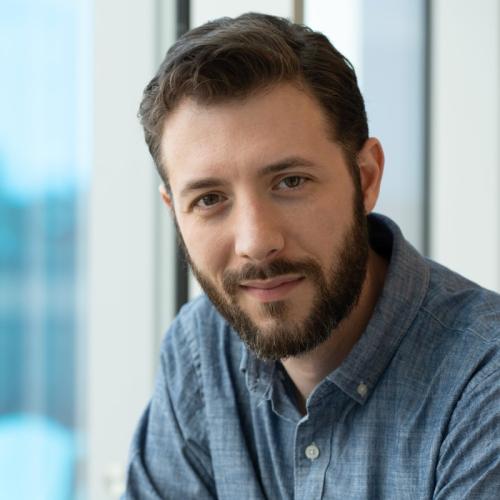
NPR Video Producer Bronson Arcuri got his first taste of public media at Ohio University and WOUB

When Bronson Arcuri left his hometown of Painesville, Ohio and came to Ohio University in the fall of 2006, he had no idea he would end up working in media as a video producer for NPR. In fact, he started school as a history major.
“I was not clear on what I wanted to do with my life,” said Arcuri. “Before classes even started, I switched to an aviation major. But after a bit, I decided that lifestyle wasn’t right for me. So, I went to my counselor and asked what I should do. I told the counselor how I liked making short films and comedy sketches with my friends in high school, and I ended up becoming a media management major.”
Once that decision was made, things started to click for Arcuri.
“Through the Work Study program, I started in a paid position at WOUB,” said Arcuri. “I remember where I was when I found out that I got the job. I was walking down the path behind Lincoln Hall. The title of my WOUB position was associate producer, which I thought was a cool title and job, and I got to work in the development department.”
Arcuri helped with fundraising and advertising initiatives at WOUB. He helped put together a video that was used during a WOUB TV pledge drive. Arcuri also remembers sitting in on business meetings which gave him a behind the scenes look at a professional media operation.
“I was doing all of this personal production with my friends, but I didn’t have a lot of business acumen,” said Arcuri. “Having a foot in that world with a real organization that was doing professional media business really lined me up well to work somewhere like NPR.”
Arcuri says his WOUB experience also exposed him to the world of public media and the idea of mission-driven media.
“Dr. Carolyn Lewis, who was WOUB’s general manager at the time, was one of my professors, and she was so kind and generous with her time. She really believed in me. That sort of personality she had and her belief in a mission-driven communications organization really called to me.”
After graduation, Arcuri went to New York and worked as a production assistant on TV shows and movies. But it wasn’t a good fit. Eventually a temp job opened up at NPR, and Arcuri jumped at it.
“The temp job eventually turned permanent, which was wonderful. I’ve been at NPR for seven years now.” In that time Arcuri has worked as a director for the Tiny Desk concert series, as well as a creator and director of the economics explainer video series Planet Money Shorts and the politics series Ron’s Office Hours. Now he’s a part of the leadership team developing news products for emerging platforms, including Instagram and TikTok. He also oversees NPR’s video coverage of the war in Ukraine and manages short-form video production for All Things Considered, Life Kit, and NPR’s international and political coverage.
Arcuri says he knows that many think working as a video producer for an audio/radio organization is a little strange. But in the new media world, he says NPR’s expansion into video storytelling is vitally important to the public media mission.
“As the media landscape is changing, we’re trying to expand as a media organization and part of that is video,” said Arcuri. “In the early 60’s FCC Chairman Newton Minow said, ‘When TV is good, nothing is better. When TV is bad, nothing is worse.’ That’s Instagram and TikTok today. It’s where people are, and it’s our job to meet them there with accurate and reliable programming.”
